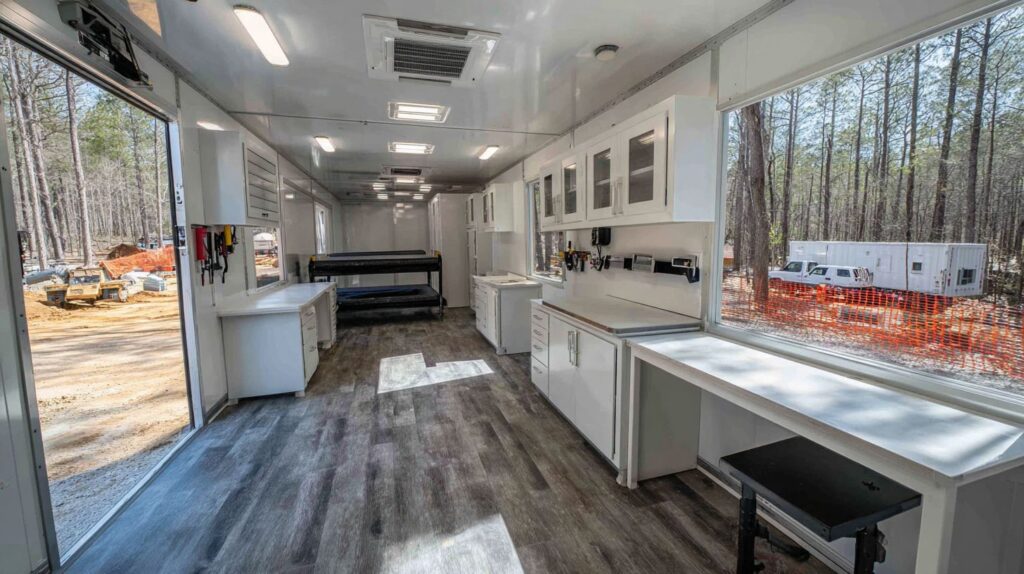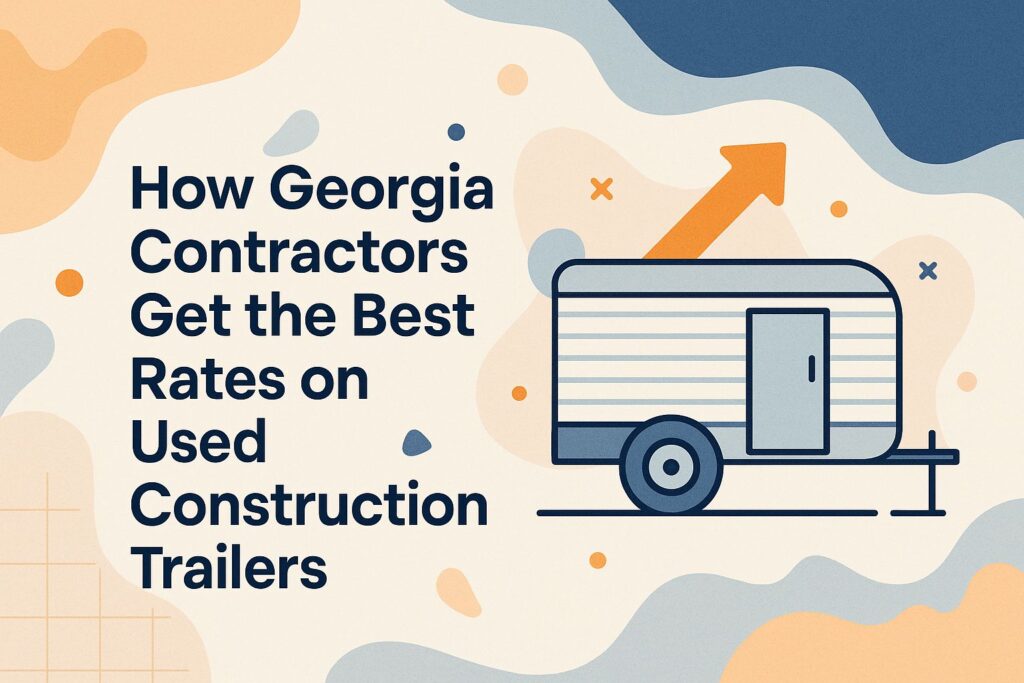
How Georgia Contractors Get the Best Rates on Used Construction Trailers
Figuring out how to buy used construction trailers can be challenging, particularly when you’re trying to stick to a budget. For contractors in Georgia, securing the best possible prices is essential for maintaining your profits. Learn how to identify current market trends, check trailer conditions, and improve your negotiation skills. Having the correct details helps you make agreements that keep your projects running smoothly and within budget. Learn how to cut costs on your next trailer buy.
Definition and Purpose
Used construction trailers are pre-owned mobile structures designed for various functions, including site offices, storage, and worker accommodations.
These trailers provide options in construction projects, letting teams adjust to different requirements, improving project efficiency.
For instance, a site office trailer can serve as a command center for project managers, equipped with essential tools like Wi-Fi, desks, and filing cabinets, ensuring operational efficiency.
Storage trailers, on the other hand, are essential for protecting tools and materials from theft and weather damage.
When selecting a trailer, consider its size, condition, and features like HVAC systems for comfort or locking mechanisms for security.
Various suppliers and local classifieds can provide an array of options suitable for different budgets.
Benefits of Using Used Trailers
Opting for used trailers can lead to substantial cost savings, often reducing initial investment by up to 50% compared to new models, enhancing contractor savings.
Used trailers are often long-lasting because many are built to handle tough conditions.
For instance, a construction company saved thousands by purchasing a used 20-foot utility trailer for $4,000 instead of the $8,000 for a new one. They used websites like Craigslist and attended local auctions to find good deals, making sure to thoroughly check the condition through detailed inspections.
This strategic decision reduced costs and gave them a dependable tool that improved how well they worked.
Learning About the Market for Secondhand Construction Trailers
The market for used construction trailers changes regularly based on factors such as local demand and the economy, especially in Georgia, affecting both trailer prices and resale value. For those interested in understanding the financial aspect, discover the current costs of used construction trailers in Georgia to gain deeper insights into price fluctuations.
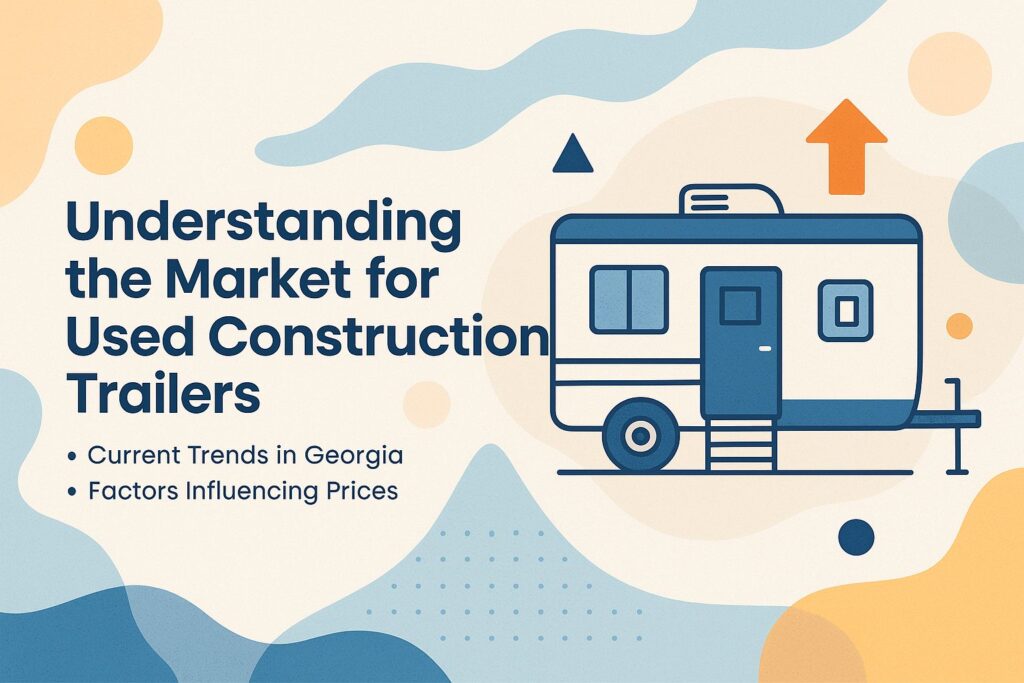
Current Trends in Georgia
In Georgia, the demand for used construction trailers has surged, reflecting a growing trend towards cost-effective portable solutions among contractors.
This trend is fueled by a 20% rise in trailer sales over the past year, largely driven by a booming construction sector. Contractors are looking for mobile workspaces to improve how job sites operate.
Craigslist and Facebook Marketplace are great places to find cheap used items. The Georgia Department of Transportation (GDOT) offers rules that help you follow trailer use laws at work sites.
By investing in these trailers, contractors can save on rental costs and maintain project flexibility, ensuring long-term savings.
Factors Influencing Prices
Prices for used construction trailers fluctuate based on factors such as age, condition, and market demand, with depreciation rates averaging 10-15% annually, impacting cash flow management.
For example, a well-maintained trailer from 2015 might cost between $8,000 and $12,000, while one from 2000 typically ranges from $3,000 to $5,000.
Trailers with heavy customization, like added tool storage or reinforced floors, often command higher prices, especially if in good working condition, highlighting the importance of trailer specifications.
Local market trends can significantly impact cost, so it’s advisable to research comparable listings in your area and factor in transportation costs if purchasing from a distant location. As mentioned in our analysis of how much used construction trailers cost in Georgia, geographic factors can drastically affect pricing.
Researching Options for Used Construction Trailers
Detailed research is important when looking for the best used construction trailers.
Check online marketplaces and local auctions for purchase options, exploring both local suppliers and third-party sellers. For those interested in Georgia-based solutions, you can explore options to buy used construction trailers serving all of Georgia to find the best deals.
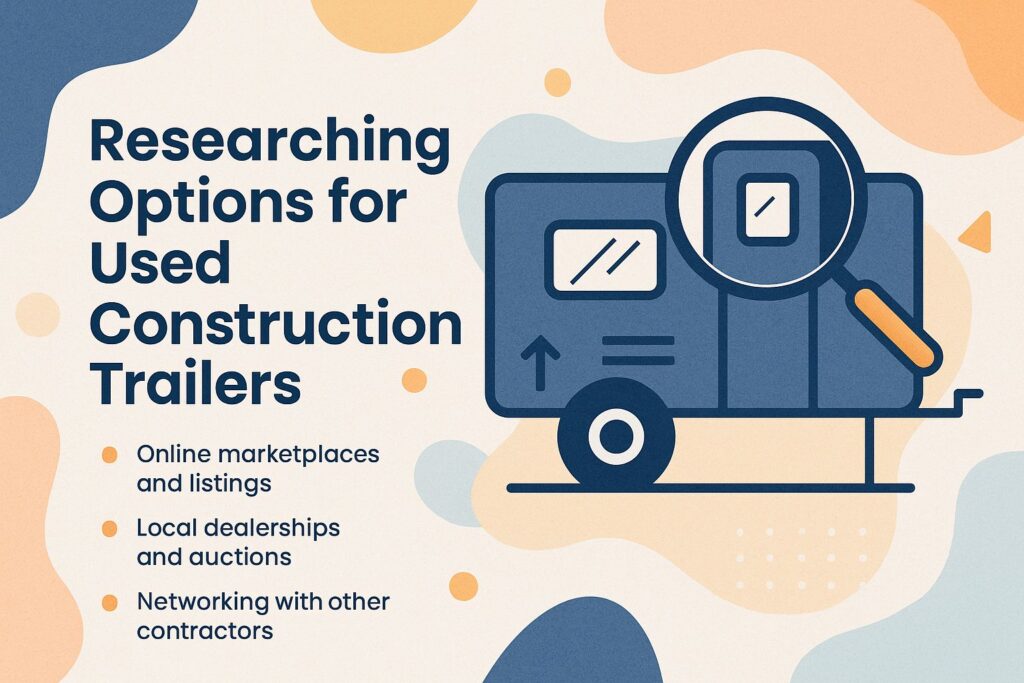
Online Marketplaces and Listings
Websites like eBay, Craigslist, and Facebook Marketplace are important for contractors looking for good deals on used trailers, providing many choices from the used equipment market.
- To use these marketplaces well, begin by creating alerts for the models you want, so you get updates when new listings show up.
- Use filtering options to narrow down your search based on location, price range, and trailer type. For example, you might filter for ‘utility trailers’ under $5,000 within a 50-mile radius.
- Always compare prices across platforms to identify the best deals, and check recent listings on eBay with exact model numbers to get a sense of the market value.
Local Dealerships and Auctions
Local dealerships and equipment auctions present unique opportunities to purchase used trailers, often allowing for direct inspection and negotiation.
To identify reputable dealerships, check for customer reviews on platforms like Google and Yelp, and see if they offer service history for their trailers.
Local auction houses, such as Ritchie Bros. or your nearby county auction, frequently host events where you can evaluate trailers in person. Many buyers have succeeded in obtaining high-quality trailers at these auctions by attending preview days, which allows for thorough inspections.
Connecting with local business groups can provide useful advice for finding reliable sellers and auctions.
Networking with Other Contractors
Connecting with other contractors can help you find useful information and opportunities for buying used trailers near you.
To effectively network, consider these actionable steps, including exploring contractor networking opportunities.
- Join local contractor associations, which often hold events that facilitate introductions.
- Attend trade shows where you can meet suppliers and contractors face-to-face.
- Participate in online forums or social media groups dedicated to construction.
- Use platforms like LinkedIn to network with people in your field, display your work, and interact with informative content.
These efforts can significantly expand your network and increase your chances of finding the right trailer at a competitive price.
Evaluating Trailer Condition and Value
Looking at the condition and cost of used trailers is important for contractors to make a wise purchase.
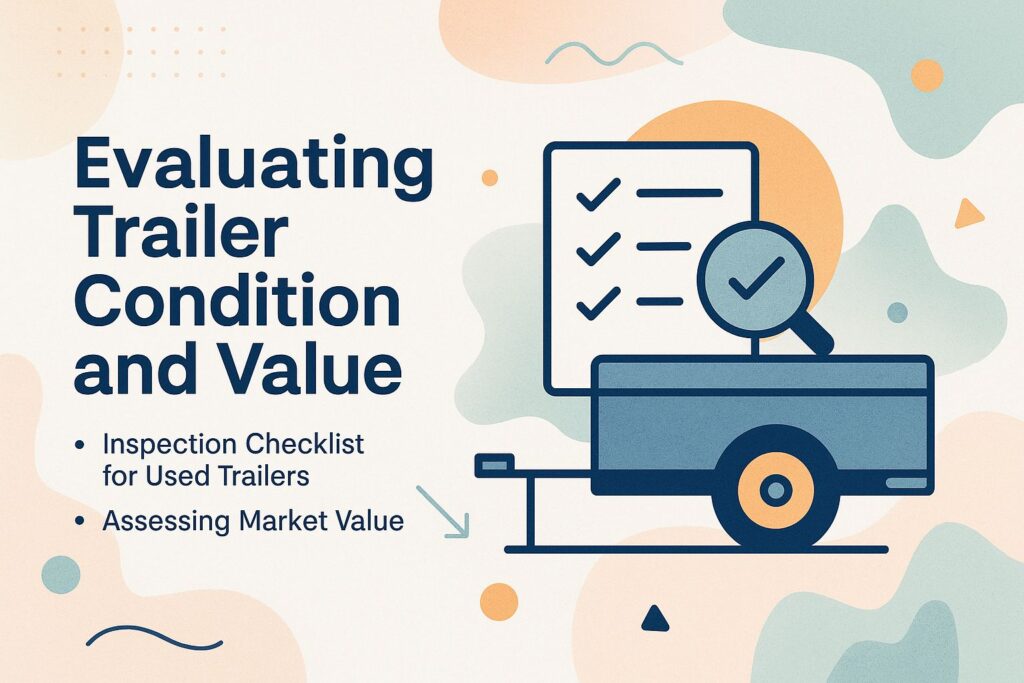
Inspection Checklist for Used Trailers
An inspection checklist covers important areas such as the strength of the structure, electrical systems, and heating and cooling functions to make sure the trailer fits your requirements, ensuring trailer maintenance is up to standard.
- Start with structural integrity-check for any signs of rust by using a magnet to examine the frame and undercarriage.
- Next, check all electrical outlets with a circuit tester to confirm they are working properly.
- For the HVAC system, verify functionality by running both heating and cooling modes, listening for unusual sounds that might indicate issues.
- Assign a score from 1 to 5 for each category based on your inspections to have a clear, quantifiable view of the trailer’s condition.
Assessing Market Value
Assessing the market value of used trailers involves comparing similar models on platforms like Kelley Blue Book and local listings to gauge fair pricing.
- Start by identifying comparable trailers in your area, ensuring they have similar specifications such as age, condition, and features.
- Use online resources like Craigslist and Facebook Marketplace for regional comparisons. Tools like NADA Guides provide a complete database for retail and trade-in prices.
- It’s essential to factor in depreciation, which can significantly impact value; trailers typically lose 15-20% of their value annually.
- To get a correct evaluation, look at market trends and examine past prices in your location.
Negotiating the Best Rates
Good negotiation skills can help save a lot of money when buying used construction trailers, often cutting costs by 10-20%. If you’re curious about how much used construction trailers typically cost, understanding the price range can further enhance your negotiation strategy.

Understanding Seller Motivations
Knowing if a seller is in a hurry, has financial issues, or wants to reduce inventory can be useful during negotiations.
To understand why a seller wants to sell, have a frank conversation and do detailed research on their history. Ask clear questions like, “Why did you decide to sell at this time?” This can show urgency related to regulatory compliance.
Ask about their schedule: “Do you have any upcoming deadlines?” To understand financial needs better, ask, “Have you had trouble managing this property or asset?”
These questions help you understand the situation better and plan your negotiation approach effectively.
Strategies for Effective Negotiation
Using tactics like providing initial offers, setting a budget, and being ready to leave can improve negotiation outcomes.
To further strengthen your negotiation, consider these actionable tactics:
- First, gather comparable sales data from recent transactions in your industry to support your price point.
- Second, use silence; after you present your offer, pause so the other person feels encouraged to respond.
For instance, in a recent tech company acquisition, the buyer presented data showcasing lower valuations of competitors, which led to a $500,000 reduction from the initial asking price.
Strong evidence strengthens belief, while silence can increase tension, leading to compromises.
Financing Options for Used Construction Trailers
Looking into financing methods is important for contractors who want to buy used construction trailers, with different loans and leasing deals available.
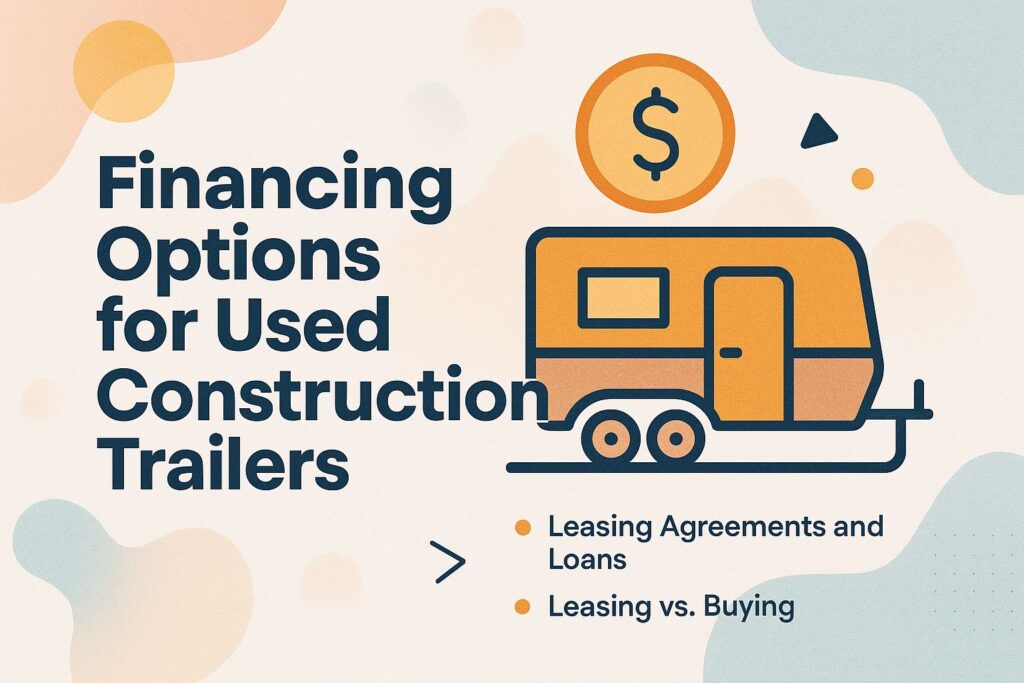
Leasing Agreements and Loans
Contractors can look into special loans from lenders like The GreenSky Loan Program, which provide financing up to $65,000 with interest rates around 7-10%.
Another excellent option for Georgia contractors is the historic renovation loan from the FHA, which can cover up to 96.5% of the project costs if the property is owner-occupied. This is particularly beneficial for contractors working on homes that need major repairs.
Consider the SBA’s 504 loan program, a key player in construction finance, which offers long-term financing for larger projects over $250,000, typically with a fixed rate of around 4-6%. To maximize benefits, assess your business needs and project scope, then choose the loan payment plans that best align with your financial situation.
Leasing vs. Buying: Exploring Leasing Options
Choosing between renting and buying used trailers requires considering long-term expenses versus ease of use. Trailer rental typically benefits short-term requirements.
Leasing a trailer often costs less upfront, which can be easier for businesses with limited funds. For instance, a monthly lease payment of $300 versus a $10,000 purchase means you can allocate funds elsewhere.
If you intend to use the trailer for many years, buying it could cost less overall and save you money over time. For instance, if you lease a trailer for $3,600 each year and use it for ten years, you would spend a total of $36,000. This is compared to paying once to buy it, which also helps in managing the asset better.
Assess your project duration and contractor budget to determine the best option for equipment leasing.
Legal Considerations in Purchasing Used Trailers and Trailer Types
Georgia contractors need to know the legal matters when purchasing used construction trailers, including how to register and transfer the title, and being familiar with different trailer types.
Registration and Title Transfer: Legal Process and Supplier Relationships
Registering a used construction trailer involves completing necessary paperwork and ensuring compliance with local regulations, which can vary by state and affect supplier relationships.
To start, gather essential documents such as the trailer’s original title, a bill of sale, and proof of identification. Some states may require a VIN verification form or a vehicle inspection, so check your local DMV website for specifics to facilitate supplier negotiations.
Next, fill out the application for title transfer and registration. Be vigilant about common pitfalls, like not signing the title or failing to provide a bill of sale, which can delay the process, impacting trailer dealerships.
Submit the paperwork and any necessary fees, usually paid by check or credit card.
Learning About Warranties and Returns: Warranty Choices
Contractors must understand warranty options and return policies when purchasing used trailers to protect their investments through warranty options.
Warranties typically fall into two categories: limited and full. A limited warranty often covers specific parts for a set period, like 90 days on brakes, while a full warranty may encompass broader defects for years, providing cost-effective solutions.
When examining return policies, focus on the time frame allowed for returns and any conditions, such as mileage or usage limits.
To discuss warranty terms well, ask if accessory parts are covered and get clear details on what maintenance is needed, as this can sometimes improve your protections and resale strategies.
Maintaining Used Construction Trailers: Heavy-Duty Trailers Maintenance
Regular maintenance is important for keeping used construction trailers in good condition and safe for work sites (our Marietta location offers expert advice on trailer upkeep).
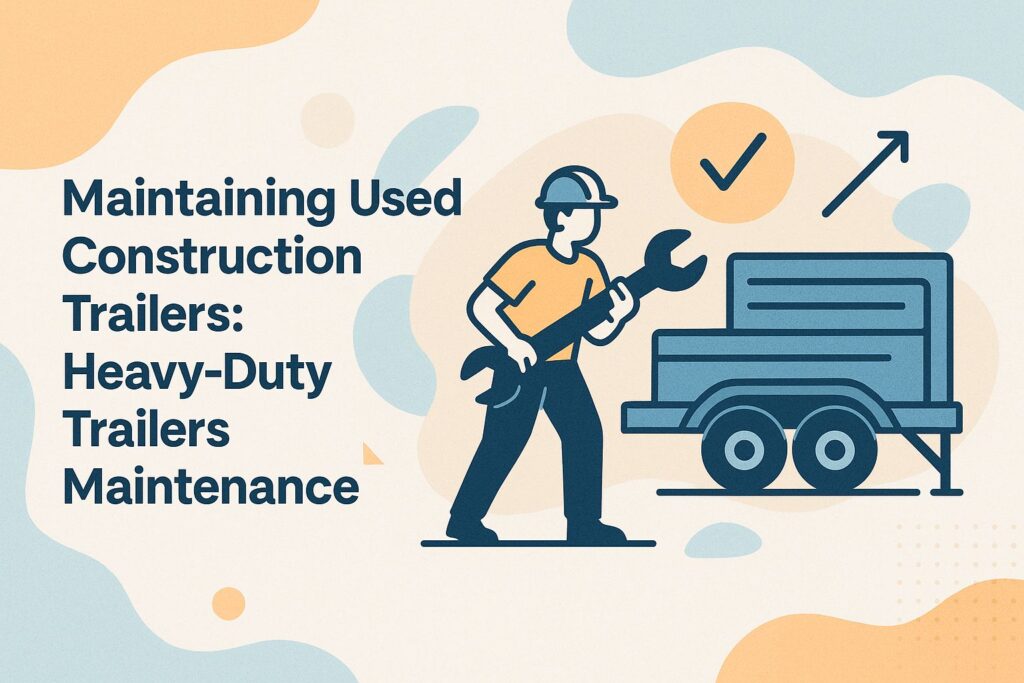
Regular Maintenance Tips: Construction Site Safety Standards
Regular checks should cover tire pressure, brake systems, and electrical components. It’s best to do this every two months to avoid expensive repairs and improve construction safety standards.
Along with these checks, consider establishing a maintenance log where you can track service dates, specialized equipment usage, and specific tasks completed.
For tires, regularly monitor tread depth and replace them when they reach 2/32 of an inch to align with industry benchmarks.
Examine the brake pads twice a year and change them if needed to maintain their proper function and meet construction safety standards.
For electrical components, test the trailer lights and connections quarterly, using a multimeter to check for voltage drops.
Following this clear plan will make your trailer last longer, reducing operational costs, and lower the chance of sudden failures.
Extending the Life of Your Trailer: Trailer Modifications and Cost-Effective Solutions
Adding protective features such as stronger floors and weatherproofing can greatly improve how long a trailer lasts and how well it works, enhancing trailer modifications.
Besides upgrades, it’s important to keep up with routine inspections. Check for any harm or wear every three months. Immediate repairs on leaks or structural issues can prevent more costly damage later, facilitating construction logistics.
Consider implementing a seasonal maintenance routine:
- Clean and reseal the roof, focusing on trailer features
- Inspect brakes and tires, enhancing service contracts
- Flush the plumbing system, complying with seasonal demand
According to industry studies, these proactive measures can reduce long-term repair costs by up to 30%, extending your trailer’s life significantly, supporting investment analysis.
About the Author
My name is Mark Redding, and I’m a writer and editor for Georgia Used Construction Trailers. I’m also the owner of Redding Modular Solutions, a successful mobile office and storage trailer company based in Savannah, Georgia. For the past 16 years, I’ve helped contractors, builders, and project managers across the Southeast find affordable, flexible solutions for on-site operations. With a background in construction logistics and field operations management, I specialize in guiding businesses toward cost-effective temporary space that supports efficiency and growth.

